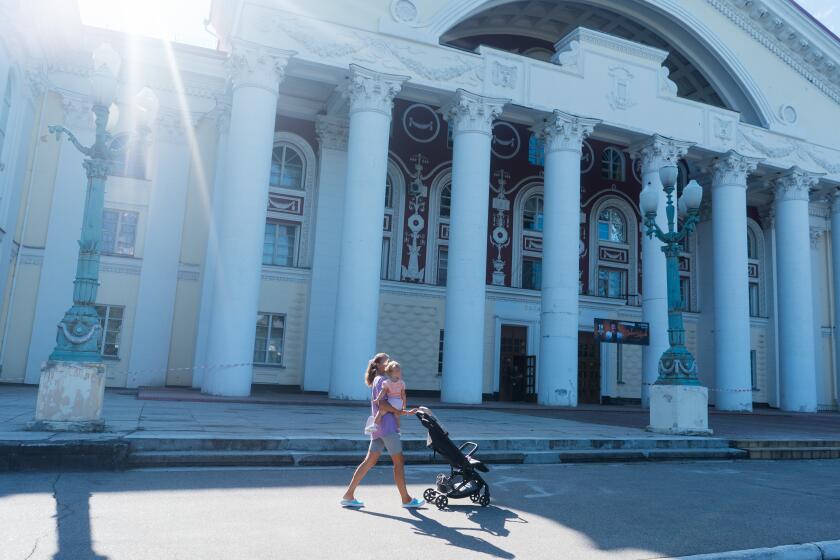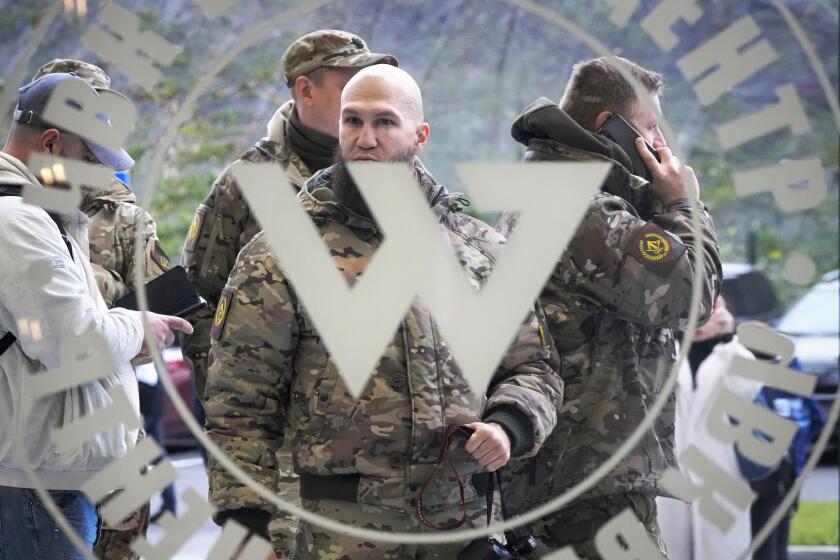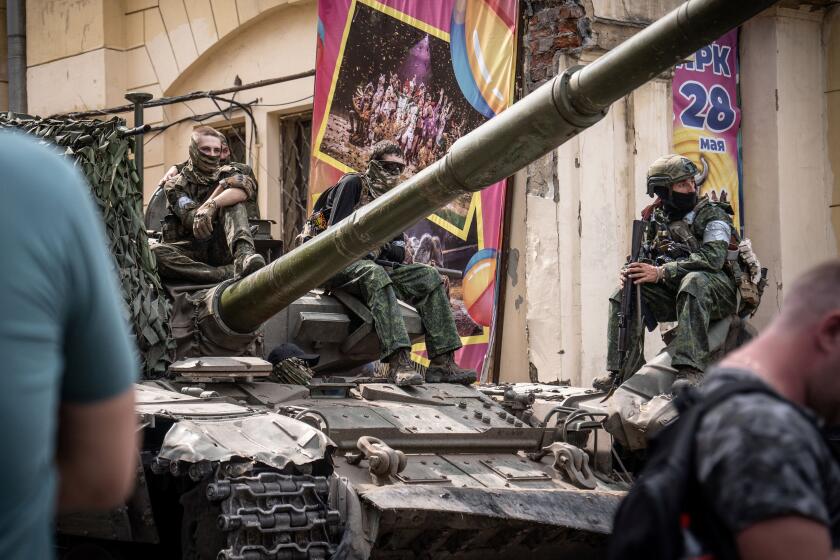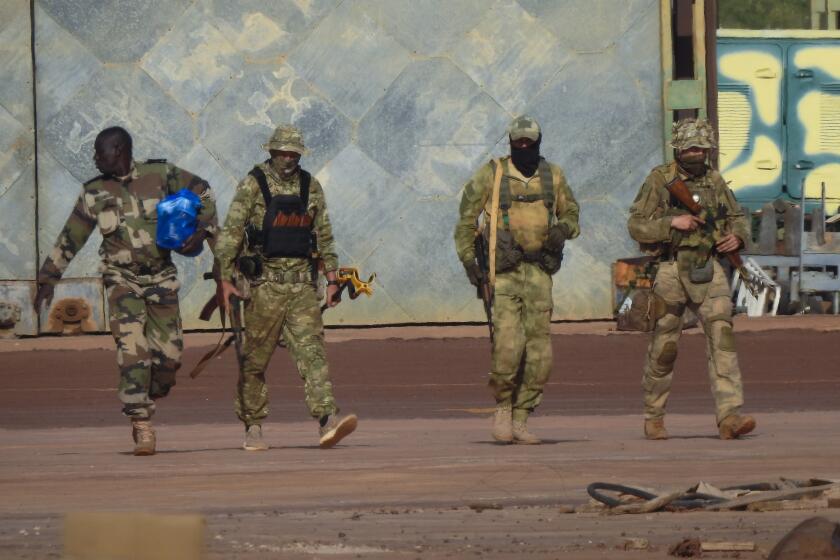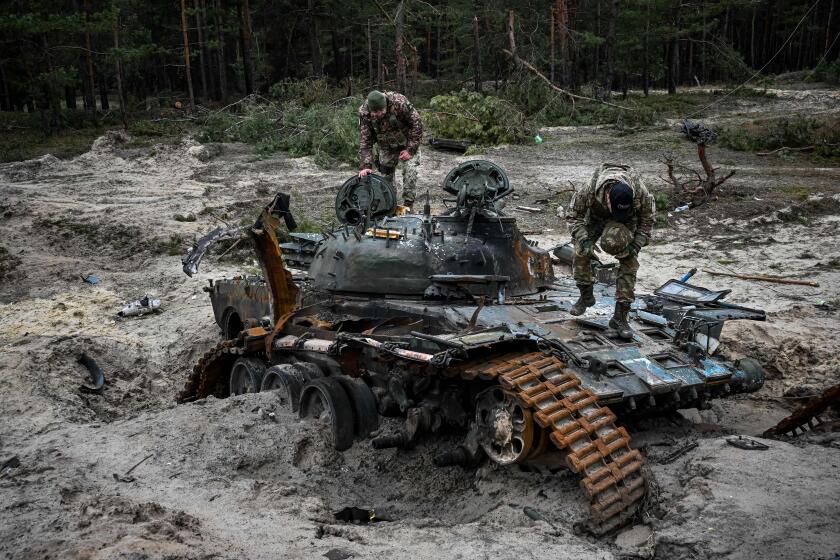Russian mercenary chief and mutineer Prigozhin killed in jet crash, state media say
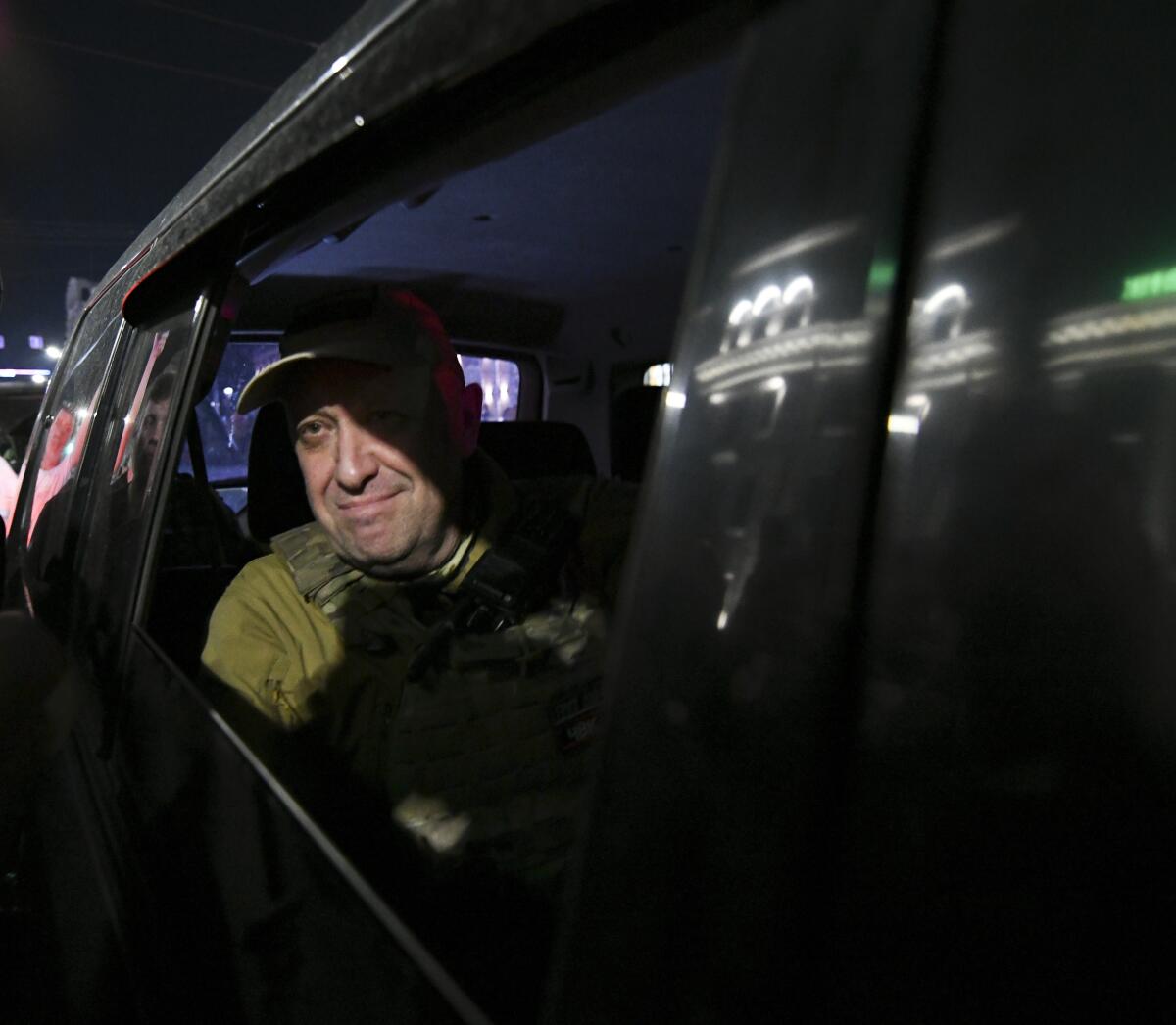
- Share via
Yevgeny Prigozhin, the notorious mercenary chieftain who led a failed uprising against Russian President Vladimir Putin’s government two months ago, was aboard a private jet that crashed north of Moscow on Wednesday with no survivors, Russian officials said. His Wagner Group also reported the death.
Russia’s Tass news agency said the Federal Air Transport Agency published the names of all passengers and crew members who were on board the Embraer aircraft that was traveling from the capital to St. Petersburg — including the 62-year-old Prigozhin.
A channel on the messaging app Telegram linked to Prigozhin’s Wagner Group mercenary forces described him as a “true patriot of his Motherland” who had “died as a result of the actions of traitors to Russia.”
“But even in Hell, he will be the best!” said the statement from the Grey Zone channel, paraphrasing one of the group’s slogans.
Prigozhin’s reported death, which has yet to be formally announced by the Kremlin, would mark the ultimate twist in a saga worthy of a Russian novel: a onetime confidant of Putin who rose from small-time thuggery to the head of a lucrative — and ruthless — private army before turning against his chief patron.
News of Prigozhin’s apparent demise sparked speculation about whether the crash had been orchestrated by the Kremlin. Putin has been widely blamed for killing, or trying to kill, a number of political foes, including his best known critic, the imprisoned Alexei Navalny, who suffered a near-fatal poisoning.
Crude, crass and bellicose, Prigozhin left a heavy imprint on the war in Ukraine. His Wagner Group forces, bolstered by prison-recruited fighters, were responsible for one of Russia’s few military victories in the 18-month-old conflict, the capture in May of the eastern city of Bakhmut. The battle was a bloodbath for both sides.
A Ukrainian city grapples over whether to rename its history museum, currently named after a great-uncle of warlord Yevgeny Prigozhin
Buoyed by that triumph, Prigozhin, who had long been an antagonist of Russia’s top military brass, spearheaded a mutiny in June, which while short-lived, posed the biggest threat to Putin’s more than two-decade rule.
The official version of how Prigozhin’s 48-hour mutiny in June was resolved — by a deal purportedly negotiated by Belarusian President Alexander Lukashenko — was met with widespread skepticism at the time. Lukashenko is considered a puppet of Putin, who propped him up when Lukashenko’s implausible claim of victory in an August 2020 election sparked a wave of popular protests.
While the Wagner rebellion was in progress, Putin railed against those behind it, denouncing them as traitors and insisting they would be punished. Analysts generally described the Russian leader as having been left weakened by the abortive coup and Prigozhin’s seeming impunity. A senior Russian military leader, Gen. Sergei Surovikin, disappeared from public view during the mutiny, and on Wednesday, Russian news outlets reported that he had been removed from his position as head of the air force.
The outcome of the mutiny — which saw Prigozhin’s forces seize a key southern military headquarters before marching toward Moscow — was as murky as many of the mercenary chief’s past dealings. The deal was said to have allowed Prigozhin’s relocation to neighboring Belarus, along with Wagner fighters who did not want to be integrated into the regular Russian army.
Russian private military contractor Wagner is busy boosting its brand as its fighters try to subdue Ukraine, trading secrecy for war propaganda movies.
But in recent weeks, he appeared to have been allowed free movement around Russia; a video that circulated Monday purportedly placed him in Africa, although the date of the recording was unclear.
There was no explanation given for the cause of the crash. Videos posted on Telegram depicted what was said to be the Embraer plunging from the sky after two explosions, a plume of smoke trailing its path. Another video said to be taken from the wreckage showed the burning remains of a plane.
The dead were said to include some top Prigozhin lieutenants, including Dmitry Utkin, a onetime special forces officer for Moscow’s military intelligence service. Utkin, with a penchant for Nazi symbols, founded the paramilitary group; he named it after his call sign, “Wagner.”
Earlier, President Biden was asked by reporters accompanying him in California and Nevada about the reports of Prigozhin’s death. Biden recalled saying after the aborted coup that the Wagner leader should be “careful what he rode in,” but he said he still did not know enough about what happened Wednesday.
“I don’t know for a fact what happened, but I’m not surprised,” Biden said. Asked whether Putin was behind the crash, Biden added: “There’s not much that happens in Russia that Putin’s not behind. But I don’t know enough to know the answer.”
The news broke late at night in Ukraine, which considers Prigozhin an implacable foe, and the government in Kyiv did not immediately issue any official response. But its backers quickly chimed in.
The prospect of a nuclear-armed superpower falling into disarray terrified neighboring countries throughout Europe and put the White House on alert.
“That was predictable,” government advisor Anton Gerashchenko, citing the crash report, wrote on X, the platform formerly known as Twitter.
Mykhailo Podolyak, an advisor to Ukrainian President Volodymyr Zelensky, posted on X that Putin had been “waiting for his moment.”
CIA Director William Burns hinted last month that Prigozhin’s days were numbered.
“Putin is someone who generally thinks that revenge is a dish best served cold,” Burns said July 23 at the Aspen security conference in Colorado. “In my experience, Putin is the ultimate apostle of payback, so I would be surprised if Prigozhin escapes further retribution.
“If I were Prigozhin, I wouldn’t fire my food taster.”
Even before Russia’s February 2022 full-scale invasion of Ukraine, Prigozhin and his companies had for years been the target of Western sanctions. He did not acknowledge his leadership of Wagner until last year, when it had already become a powerful military player outside Russia, providing Putin with plausible deniability regarding the group’s often lawless actions.
Russia has engaged in under-the-radar military operations in at least half a dozen countries in Africa in the last five years using a shadowy mercenary force analysts say is loyal to President Vladimir Putin
At the same time, Prigozhin’s domestic political clout was becoming unmistakable. Over the last year, he had directed growing vitriol not at Putin, but at his most senior military leaders. In colorful, profanity-laced videos posted on social media, he denounced the Kremlin’s Ukraine war effort as incompetent and ineffectual.
Prigozhin’s death would bring further into question the fate of his paramilitary group.
Although Wagner is no longer fighting in Ukraine, the group maintains a significant presence in Africa, where it has served as an arm of the Kremlin’s foreign outreach to the continent.
In recent years, Wagner operatives have fought in Sudan, Libya, Chad, Mali and the Central African Republic, acting as a sort of Praetorian Guard for embattled leaders or as hired guards protecting mining operations.
From his beginnings running a hot dog stand, Prigozhin launched a catering career that eventually saw him nicknamed “Putin’s chef.”
He parlayed his access to the Russian leader into lucrative contracts, allowing him to construct a business empire that included restaurants, hotels, construction and a huge media arm that ran troll farms and produced movies extolling Wagner’s military prowess.
The Ukrainian military’s surrender hotline, dubbed ‘I Want to Live,’ is enticing some Russian soldiers to quit the battlefield as the war drags on.
A native of St. Petersburg, formerly known as Leningrad — also Putin’s hometown — Prigozhin grew up steeped in the gangland culture that for decades was the seamy underbelly of the onetime imperial capital on the Baltic Sea.
His first run-in with the law, for thievery, came when he was a teenager.
Briefly incarcerated, he quickly returned to petty crimes that escalated into violence, again leading to imprisonment for most of the 1980s, this time in a penal colony.
In Russia, the price of crossing Putin has long been assumed to carry potentially lethal consequences. A number of figures who fell from his favor died under circumstances so brazenly suspicious — tumbles from high windows being a particular hazard — as to seem as much as warnings to others as a means of dispatching perceived foes.
One of his most outspoken critics, Boris Nemtsov, was gunned down a stone’s throw from the Kremlin, in 2015. And the Kremlin has demonstrated a long reach; Western governments blamed Russian intelligence for killing a turncoat KGB agent, Alexander Litvinenko, with polonium-laced tea in 2006 in London, and for the attempted poisoning of another ex-double agent, Sergei Skripal, in 2018, also in Britain. Putin’s best-known critic, the imprisoned Navalny, suffered a near-fatal poisoning three years ago.
As late as July, Lukashenko dismissed speculation that Putin would have Prigozhin killed.
“If you think Putin is so malicious and vindictive that he will ‘wipe him out’ tomorrow,” he told reporters in his capital, switching into the Russian language, “no, this will not happen.”
King reported from Washington and Bulos from Beirut. Times staff writer Tracy Wilkinson in Washington contributed to this report.
More to Read
Sign up for Essential California
The most important California stories and recommendations in your inbox every morning.
You may occasionally receive promotional content from the Los Angeles Times.
